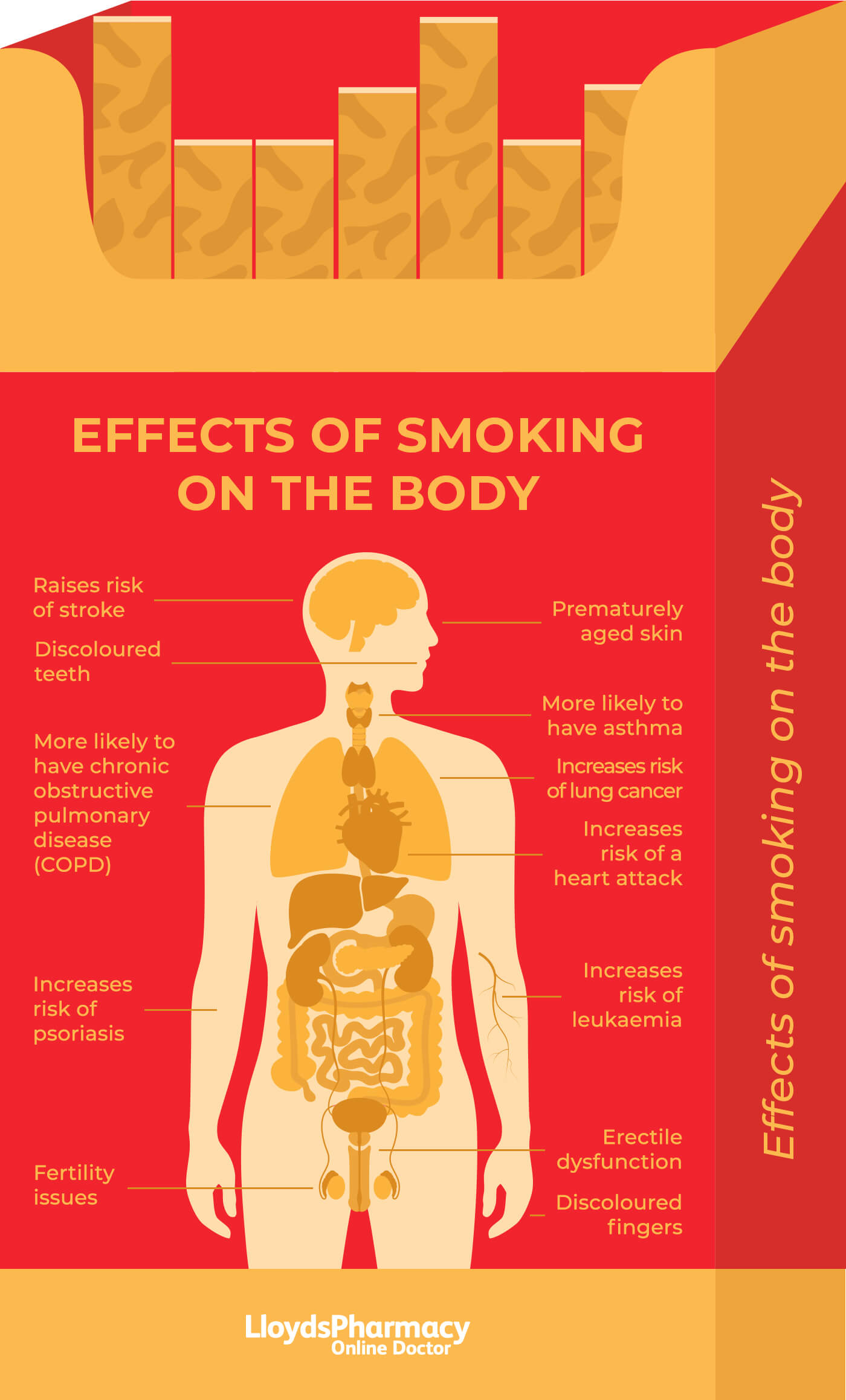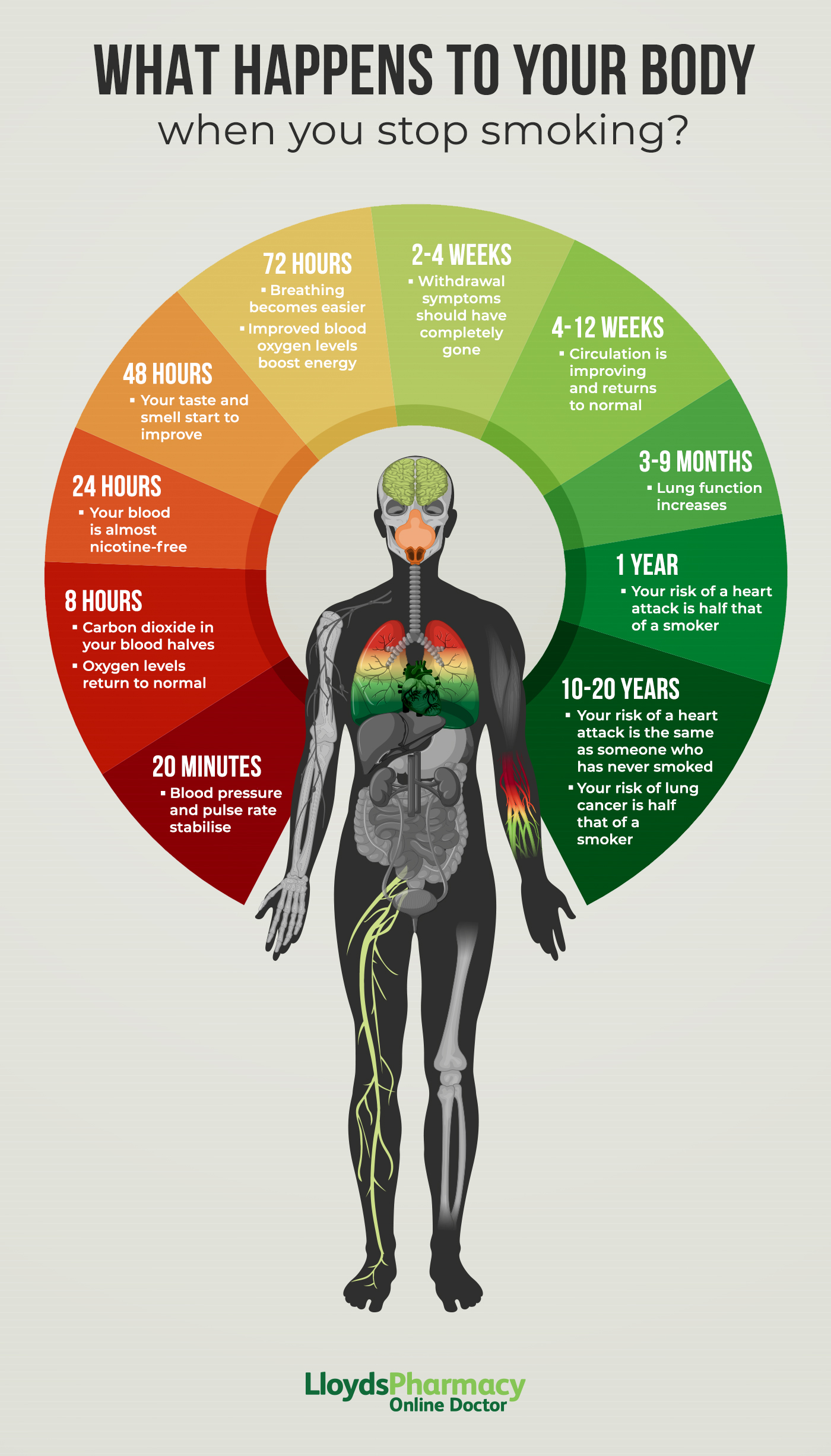What happens when you stop smoking?
Reviewed by Dr Bhavini Shah
It’s common knowledge that smoking is bad for you – but just how bad is bad? And what exactly happens to your body and your health when you quit?
In the article we’ll look at the stop smoking timeline and the benefits you can enjoy when you quit for good.
What are the dangers of smoking?
When burnt, cigarettes release over 5,000 chemicals. Many of these are poisonous and cause cancer.
Smoking increases your risk of diseases and conditions such as:
- Cancer – smoking is the single biggest cause of cancer in the world
- Chronic obstructive pulmonary disease (COPD) – nearly 9 out of 10 people who die from COPD are smokers
- Stroke – smokers are 3 times more likely to have a stroke than non-smokers
- Coronary heart disease – smokers under 40 are 5 times more likely to have a heart attack
- Psoriasis
- Hair loss
- Erectile dysfunction (ED)
- Fertility problems
- Discoloured skin and teeth

How much does smoking cost?
Smoking costs more than just your health, it is a financial issue too. The cost of cigarettes increases annually in the hopes to deter people from smoking.
A 20 pack of cigarettes is around £14. The average smoker who smokes 20 a day will spend over £5,000 a year. So, quitting could lead to a significant boost to your finances.
What are the 4 stages to quit smoking?
Everyone’s journey to being smoke free is different. But normally people go through four stages when they decide to quit smoking, these include:
- Contemplation – When you begin to think about stopping smoking. You may have a list of reasons for quitting.
- Preparation – Once you decide you want to quit you can get ready. You can see what treatments or services could help you. Find out how to stop smoking.
- Action – This is when you have your last cigarette. You’ll have to get through cravings and withdrawal symptoms. This may be a difficult stage. You’ll need to avoid relapsing and use the resources you found in the preparation stage to help.
- Maintenance – After not smoking for a month withdrawal symptom should be gone, now you can focus on maintaining your new lifestyle.
“Going through these stages is completely normal and an important page of anyone’s stop smoking journey. It can take multiple attempts to quit smoking, and your willpower may be tested along the way. But keep going, the benefits are worth it.” - Dr Bhavini Shah
The stop smoking timeline
Have you ever wondered what happens to your body when you stop smoking? When you stop smoking your body starts to recover from improved circulation to lower risk of heart attacks. For a more detailed explanation of what happens to your body when you stop smoking check out the timeline below:

20 minutes
When you smoke, your heart rate increases. About 20 minutes after finishing your last cigarette, your blood pressure and pulse rate return to normal.
8 hours
Nicotine is addictive largely because it’s absorbed into the bloodstream quickly, leading to the release of adrenaline and dopamine (and giving you that familiar headrush), and wears off quickly – causing you to seek the hit again and again. After about 8 hours, nicotine levels in your blood will have halved, and withdrawal symptoms will start to emerge.
The good news is, at around the 8 hour mark, carbon monoxide levels in your blood will also have dropped to around half. The carbon monoxide you inhale in cigarette smoke decreases the amount of oxygen that gets to your heart and at this point, oxygen levels will just be returning to normal.
24 hours
Right now, your withdrawal symptoms will be starting to peak. Expect irritability, disturbed sleep, cravings, difficulty concentrating and increased appetite. It’s not pretty, but it won’t last forever.
Carbon monoxide is the first toxin from smoking to leave your body. This means your oxygen levels can increase too.
48 hours
The chemicals in cigarette smoke lead to the overproduction of mucus in your lungs. They also paralyse cilia – tiny, hair-like structures that line the lungs and help to clear out mucus and dirt. After two days, your cilia should be hard at work once again, allowing your lungs to get rid of mucus, dust, dirt and other gunk that’s been collecting there. At this point, your bloodstream will also be clear of nicotine.
Best of all, your ability to taste and smell will have already started to improve by this point – breathing in hot, toxic cigarette smoke can seriously numb your senses, but after 48 hours’ respite, they’ll be waking up again.
72 hours
Smoking causes breathing difficulty by damaging lung tissue and irritating and inflaming your airways. After around 3 days, breathing should become a lot easier. Your bronchial tubes will begin to relax, allowing for greater intake of air.
Combined with decreased carbon monoxide levels, this will boost the amount of oxygen in the bloodstream. This in turn will lead to improved energy levels.
Now the hard part: around this time, your withdrawal symptoms will probably be peaking. This is because by day three, your body will be completely clear of nicotine, thus your cravings and symptoms will be entering overdrive. The good news is, the first week is usually the hardest. Hold tight.
2-4 weeks
At this point in the process, your withdrawal symptoms should have passed completely. If a month goes by and you’re still having symptoms, talk to your GP.
4-12 weeks
The toxins in smoke increase the strain on your heart (by making it pump blood harder and faster), and narrow your arteries. These factors can lead to life-threatening conditions such as stroke and heart attack. The good news is, around four weeks after you quit smoking, your circulatory system will begin to improve.
3-9 months
After three months, your lung function will have increased significantly. At the 9 month mark, it should have increased by around 10%.
1 year
Your risk of a heart attack will be about half that of a person who is still smoking.
10-20 years
Your risk of a heart attack is now the same as someone who has never smoked. And your risk of lung cancer is around half that of a person still smoking. Hats off.
Benefits of stopping smoking
Still not convinced? Read our lifestyle advice for more reasons to quit. Plus, here’s a reminder of why you should ditch smoking once and for all.
- Breathing becomes easier
- Circulation and heart health improve
- Your sex life will improve – smoking can cause erectile dysfunction in men. Stopping smoking leads to increased blood-flow, allowing for men to achieve better erections, and leading to greater sensitivity
- Fertility can improve - Smoking often leads to difficulties conceiving in women – so quitting should be top of your list of priorities if you’re thinking of trying for a baby
- Halt further skin damage and can give you a healthier complexion – due to the greater uptake of oxygen
- Your teeth will get whiter
- Yellowing fingers and fingernails will also fade back to normal once you quit
- You’ll enjoy eating and drinking as your senses of smell and taste return
- You’ll have more energy
- You’ll live longer – men who quit smoking by 30 add 10 years to their life
- Your loved ones will live longer – more than 80% of second-hand smoke is invisible and odourless, meaning you could be putting other people at risk without being aware of it
“Quitting smoking can be really tough. Stopping smoking can have a positive impact on your health. Helping you to live longer and enjoy more time with the people who matter the most.” Dr Bhavini Shah
Conclusion
Now we’ve seen just how good giving up smoking is for your overall health. There’s no better time to think about quitting than now. We have treatments and advice that can help. Get started on your journey to better health today.
References
https://www.nhs.uk/better-health/quit-smoking/
https://www.nhs.uk/live-well/quit-smoking/
https://www.stroke.org.uk/sites/default/files/publications/smoking_and_the_risk_of_stroke_0.pdf
https://onlinelibrary.wiley.com/doi/10.1111/jocd.13727
https://www.bbc.co.uk/news/health-68875556
https://yorkshiresmokefree.nhs.uk/pages/carbon-monoxide-overview





